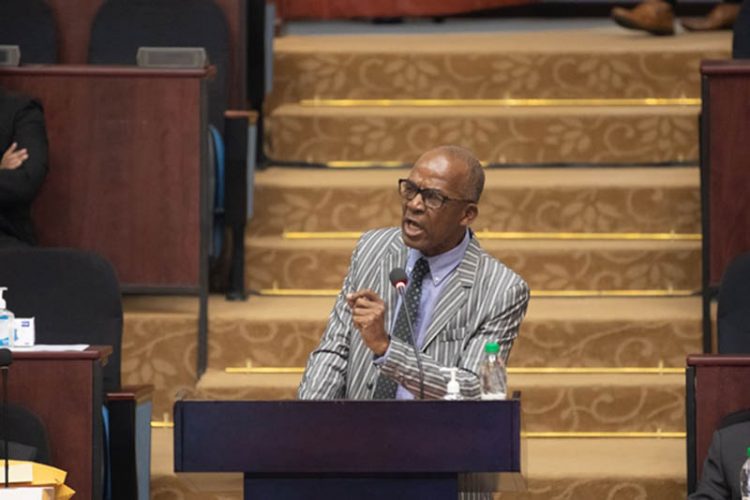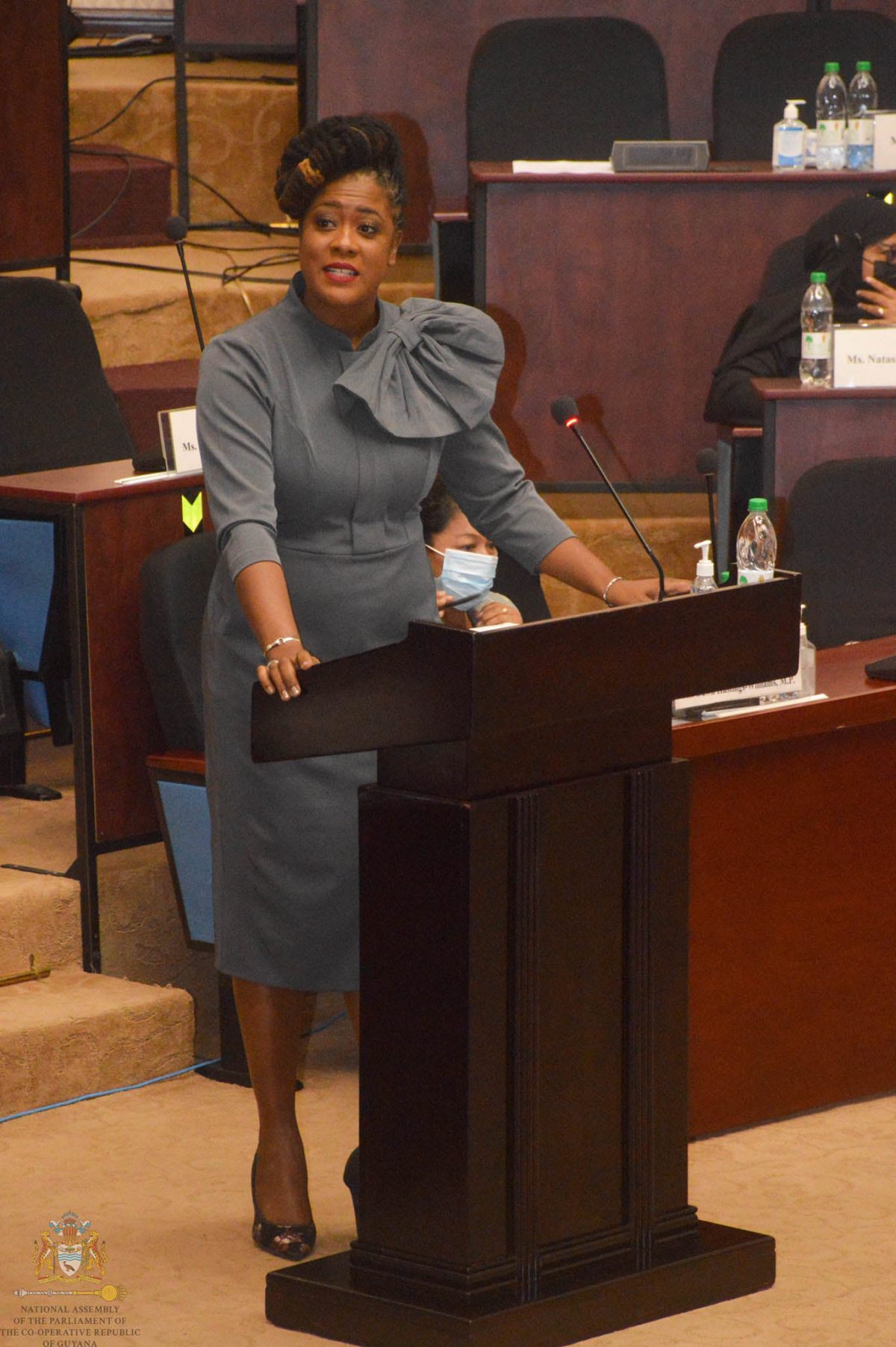APNU+AFC frontbencher Amanza Walton-Desir yesterday hammered the government for its perceived failure to address the effects of inflation and to take better care of the neediest citizens as she opened the parliamentary debate on the $552.9 billion national budget.
“The Minister with responsibility for Finance stood in this House and told the people of Guyana that in 2021 inflation was close to 6 % and food price inflation in particular was approximately 12%. Yet Mr. Speaker, this government has given to our public servants a meagre 5% after tax increase over a period of two years… The PPP/C government refused to give Guyanese an increase that would at least help them meet the increase in the cost of basic food—food which we need to live…That is how much they care,” said Walton-Desir, who labelled the budget the most “disrespectful, discriminatory, deceitful budget” to ever be presented.

She noted in particular that she was yet to hear clearly articulated the projects that would be funded by the US$607 million that the government has made available from the Natural Relief Fund even as she lamented the disregard for the safety nets that were in place under the former APNU+AFC government.
Senior Minister in the Office of the President with responsibility for Finance Dr Ashni Singh last Wednesday presented the budget in the National Assembly. Among the provisions in the budget are a $10,000 increase in the monthly income tax threshold; a lowered tax on pick-ups and trucks; a hike in old age pension, public assistance and cash grants for school children; support for dialysis patients; an increase in the mortgage loan ceiling; and reductions in the cost of medical and life insurance.
Significant investments were also outlined in the budget for sugar, agriculture, drainage and irrigation and livestock and crop cultivation.
But Walton-Desir was not moved by these and while repeating the mantra “Show me where you spend your money and I will tell you what you value” over and over, she took the government to task for not making provision for adequate training and went at length to show how it could have reduced the budgeted amount for capital expenses and used the leftover sum to really impact the lives of ordinary Guyanese.
Regally attired with a hairstyle to match, the first-time parliamentarian was heckled by those from the government side. She was boisterously supported by her colleagues at times and she marched on as she argued the point that the budget presented would not make an impact in the lives of ordinary Guyanese but would only serve as a booster to the business community.
Her presentation was later dismissed by Minister of Labour Joseph Hamilton as being just the fluttering of a headless chicken. Questioned by Speaker Manzoor Nadir as to whether he was imputing something to the parliamentarian, Hamilton responded: “I am saying that the opposition represented is a barnyard of headless creole fowls… headless yard fowls.”
He projected that over the next five days of the budget debate the nation will see as it relates to the opposition the immoral speaking about morality, the corrupt speaking about corruption, and the incapable talking about capability.
And if he is to be believed, many of the opposition members will grow old sitting on that side of the House. As to developmental projects under the former APNU+AFC government, Hamilton said the only thing they can boast about is the deplorable D’Urban Park into which millions were poured and today only serves as a sleeping place for vagrants.
Daily struggle
According to Walton-Desir, the average Guyanese is in a daily struggle just to find meals, while crime is rampant and corruption is rife. Notwithstanding each announcement of another oil find, she said, “hardworking Guyanese seem to sink deeper and deeper into despair and discouragement”.
Walton-Desir pointed out that the PPP/C government has chosen to spend $218 billion on capital expenditure, an increase of approximately 109%, although she argued that neither the central government nor the private sector has the capacity to execute such a massive increase in the programme in the ordinary scheme of things.
And the lack of capacity, she added, is exacerbated by the fact that the country like the rest of the world is in a pandemic.
Walton-Desir noted that the government has indicated that there are serious issues with the global supply chain that has affected ongoing capital projects and she questioned how it intends to complete such a massive programme over the course of the rest of the year when one considers that almost everything has to be imported to complete infrastructure projects.
She quoted an International Monetary Fund (IMF) assessment report on Guyana’s Public Investment Management that stated that Guyana has an estimated efficiency gap of 41%, which means that out of the $218 billion dollars that is allocated for capital expenditure $89 billion will be wasted due to the weaknesses in planning, budgeting, appraisal, selection, procurement and execution of capital projects.
“The IMF, in its diplomacy, will not say corruption but we big and know what they mean,” she added even as she pointed out that the country has dropped by two points on the recently released Transparency International Corruption Perceptions Index report.
Advising that wastage could be minimised, Walton-Desir said the government should focus on investing in the country’s human capital, particularly on training and development to “bring the necessary competencies to bear in order to efficiently and effectively manage massive capital spending”.
“And not only training but providing competitive remuneration so that we are not training our people to leave,” she pointed out.
And if the government were to reallocate $36 billion of the sum budgeted for capital expenditure, she said it could give 50,000 public servants a pay raise of 10%, provide free tuition for the 11,000 University of Guyana students, allocate 2.5 billion more to the university for its operations and give the 9,200 frontline healthcare workers an average of $250,000. Further, she said the sum would also be able to see a hike in the income tax threshold to $100,000 per month, increase old age pension to $35,000 per month, increase public assistance to $20,000 per month, allocate $3.5 billion on operations for Technical, Vocational Education and Training (TVET) benefitting 4,500 students, provide $2 million-business grants to 2,000 qualified small businesses, and $1.3 billion could be spent to upskill 5000 sugar workers to properly equip them for work outside of sugar, instead of keeping them tied to an industry that is dead.
All of the above could be done “right now,” she said.
“Mr. Speaker, the government boasts about $25 billion in relief measures but, Sir, by and large these measures favour big business and are not designed to help poor people. Mr. Speaker, it appears that the government is hoping that by providing all of these tax breaks to big business that the benefits will trickle down to the poor and working class Guyanese. But Mr. Speaker we know trickle-down economics don’t wuk,” she said emphatically.
On the foreign affairs front, Walton-Desir said “I don’t know where to start with you Todd,” in reference to Minister of Foreign Affairs Hugh Todd and she had to be reminded to address the minister as Honourable Member.
She hammered his ministry for what she said were poor decisions as it relates to the country’s foreign affairs and said that seasoned employees were recently recalled from foreign missions and replaced by junior staff—a situation that she said has seen a lack of leadership and confusion at many of these missions.
Walton-Desir also spoke of what she described as the glory days of this country’s foreign affairs under late Presidents Forbes Burnham, Desmond Hoyte and Cheddi Jagan.
No food to eat
In response, Hamilton stated that while Walton-Desir may be too young to remember, he remembers the glory days of foreign affairs she spoke of as a period when Guyanese starved and did not have basic food to eat.
He added that while she waxed about the vision of the past government, the APNU+AFC coalition was the most visionless government in all of Guyana’s history.
According to him, the former government took millions that should have gone to children and used it to buy more food for people at the Office of the President. He pointed out that subsidies that were provided for the elderly as it relates to their utility bills were removed and replaced by 14% VAT.
Hamilton also referred to newly-minted PNCR Leader Aubrey Norton, albeit without naming him, and said it is the “want-to-be opposition leader” who is trying to lecture the government on how to govern yet is a spectacle to the nation as it relates to electing and selecting an Opposition Leader. He said the opposition is unable to present itself as the government-in-waiting to the nation.
As it relates to training, Hamilton pointed out that under the previous government the training done under the Board of Industrial Training (BIT) was reduced to a mere 1,300, while under the current administration those trained number in the thousands. He disclosed that presently there is a technical officer that supervises TVET training in every region of the country.
On the labour front, Hamilton said for the first time every region except for Region Eight has a department of labour paying attention to workers’ rights.
“The irony is that when they are in opposition they become bright but when in government they are the dullest of the dullest. That is what you have over there!” he almost shouted.
“So, when she speaks to the issue of training, we are far ahead, way ahead of you. Under your tenure, we were an oil producing economy and you did not train persons to participate,” he further pointed out.
Hamilton also said the present government has trained many occupational health and safety officers as it relates to the oil and gas industry.
Under the last government, he also said, some 32 persons lost their lives in job-related accidents and all the administration did was hold Commissions of Inquiry and nothing to remedy the problem.
For the first year of the present government, he said, workplace-related deaths have been reduced by 16%, while some $38 million was recouped for workers who were owed wages.
“When we came to office, there were several collective labour agreements languishing out there to be concluded, workers were suffering. What did they do? NOTHING [he spelt out the word],” he said, before adding that his ministry has managed to broker some 22 labour agreements.
Hamilton also said he has evidence to show that the previous government colluded with expatriate companies to ensure tax evasion by workers.
“This is a serious allegation. I have the evidence. They deliberately colluded with foreign governments to ensure that workers did not pay taxes and over time,” he maintained, while claiming that the intention was to hide the huge salaries for those workers.
While the previous government had four labour ministers, they did nothing but flutter, the minister said.
Under the Central Recruitment and Manpower Agency, Hamilton reported, some 1,171 persons were registered with the agency and out of that number 731 persons were submitted for possible employment placement, with 186 being employed and the others awaiting interviews. He said, too, that the agency made 154 visits to secure employment for persons. And a job bank, where citizens can post their credentials and employers can post their vacancies, has been launched.










